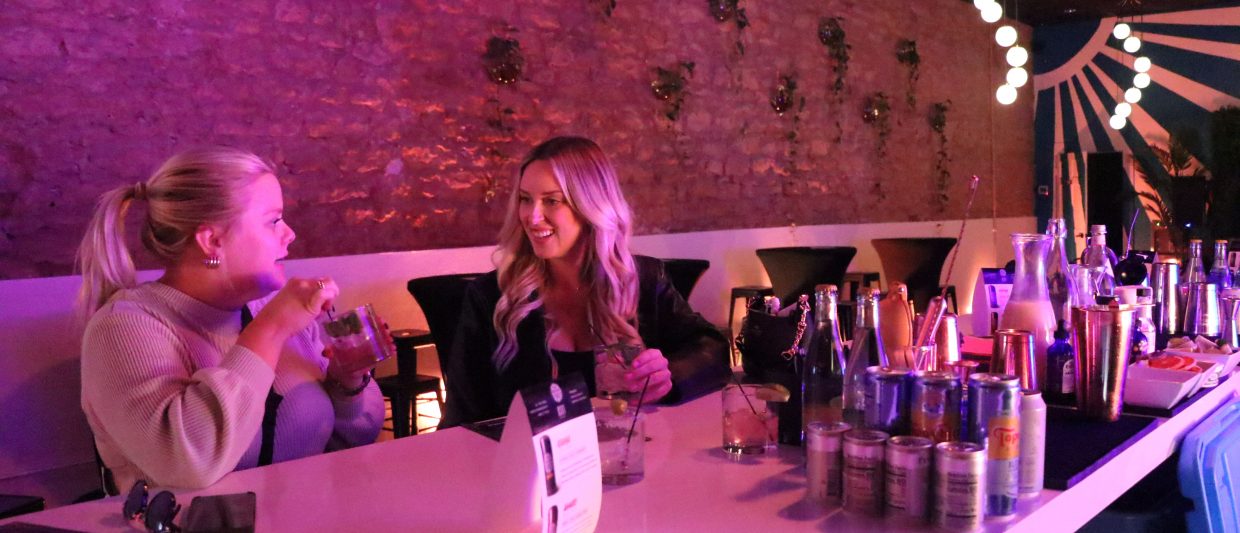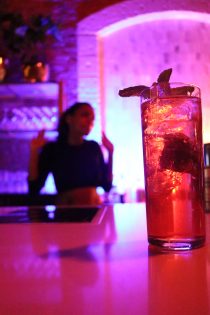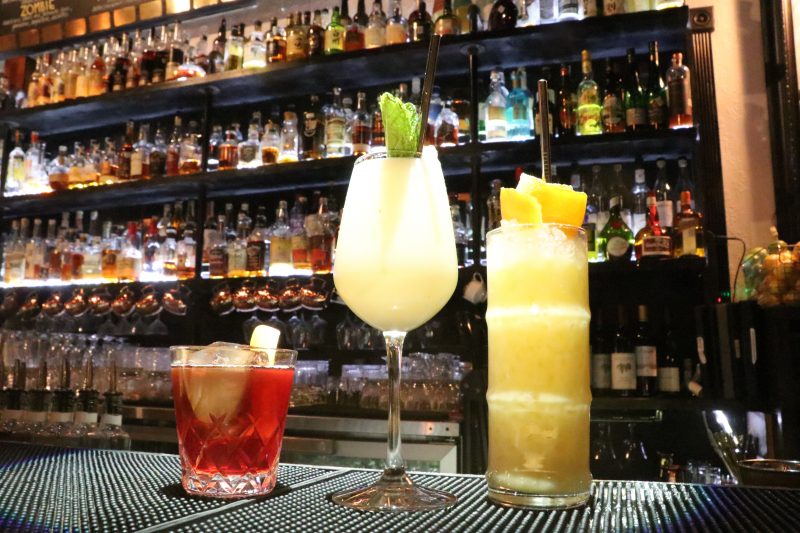As Younger Drinkers Forgo Alcohol, Bartenders Are Mixing Up More Booze-free Cocktails
By Katrina L. Spencer
Reporting Texas

Software marketer Kiona Millican, left, shares a drink with lifestyle influencer Kimberly Cobb at Sans Bar, an alcohol-free bar at 918 Congress Ave. The bar is open Friday evenings and offers a $25 option allowing customers to taste as many drinks as they like. Reporting Texas/Katrina L. Spencer
The bartenders at the Roosevelt Room in downtown Austin are as likely to grate fresh nutmeg on your beverage as they are to spray black walnut oil inside your glass.
The use of these unexpected aromatics, green herbs and curious powders make it seem like a chemistry experiment is happening every time a drink is made. Cocktail craftsmanship is their calling card.
It’s an experience, for sure, and it’s not just for those who love liquor, wine and beer.
“A cocktail is interesting whether it has alcohol or not,” said Armando Garza, a bartender at the Roosevelt Room.
The Roosevelt Room and other Austin bars are tapping into the trend of consumers forgoing alcohol when they go out for happy hours, gatherings and celebrations.
A 2023 Gallup report found that only 62% of 18- to 34-year-olds said they had occasion to drink in 2021-23, down from 72% two decades ago.
“There’s almost as many reasons to abstain as there are people,” said Denis McCarthy, a professor of psychological sciences at the University of Missouri’s Center for Addiction Research and Engagement, listing religion, health and a family history of alcoholism to name a few.
As a result, he said, the public’s attitude toward mocktails and non-alcoholic drinks has “changed drastically in the last five to 10 years.” Zero-proof cocktails “would not have made any sense 20 years ago,” McCarthy added.
Chris Marshall, 40, has built a business around sobriety in opening Sans Bar, an alcohol-free bar at 918 Congress Ave., a stone’s throw away from the Texas Capitol.
The bar welcomes customers on Friday evenings and offers a variety of engagements including trivia, deejays, karaoke, live music and panels.

Sans Bar bartender Simone Card dances after serving a zero proof mojito. Reporting Texas/Katrina L. Spencer
The drinks at Sans Bar rely on non-alcoholic spirits, bitters, chilis, florals, fruit flavors, syrups and teas and range in price from $6 to $12. Sans Bar’s menu lists strawberry, lime, mint and ginger drink flavors, showcasing the possible combinations and complexity, spirit-free.
“No one really likes the taste of alcohol,” Marshall said.
His anecdotal observation is backed by the 2021 survey “Generation Moderation?” by market research company Knit, that found that more than half of Gen Z respondents cited the taste and/or smell as their primary reason for avoiding alcohol.
Almost 45% of survey respondents listed hangovers as the second most common reason for abstaining.
“I can’t handle hangovers anymore,” said Mikayla Seiler, a 29-year-old military contractor and customer at Dear Dry Drinkery, a non-alcoholic bottle shop in East Austin that has also caught the dry wave.
Owners Joe Patterson and Grace Vroom opened their Dear Dry Drinkery storefront at 2226 E. Cesar Chavez St. in mid-2023. The business caters to those who “don’t want to be stuck drinking soda,” Patterson said.
The shop’s clients have a variety of reasons for seeking out their services. Patterson, who calls drinking alcohol a socially acceptable way of poisoning oneself, stopped drinking in solidarity with his wife who is in recovery.
“It can be very socially isolating to stop drinking,” he said.
Jamie Miller, 40, who works in office supply sales in Austin, said she stopped drinking alcohol five months ago as the amount of money she spent on alcohol became “obscene” during the pandemic, reaching thousands of dollars.
“I’ve had to learn how to be around people without being numb,” Miller said. “I don’t think I realized how shitty I felt.
“The world we live in today glorifies drinking,” she added. “It’s everywhere.”
Almost 80% of Knit’s Gen Z survey respondents indicated that socializing and connecting was their reason for drinking alcohol. The buzz was not the motivation, but rather the desire for connection.
“It never really thrilled or wowed me,” Thomas Sheehy, a 31-year-old tax examiner and regular at Sans Bar, said of alcohol.
“Unless you have the support of other people,” he said about abstaining, “you’re going to burn out.”
The Clean Sips Society, an Austin-based social group founded in May 2023, brings together people who avoid alcohol. Members met in a local park for a calisthenic workout on a cold day in January and shared canned drinks from their sponsor, Bawi, which sells a fruity, bubbly beverage in passion fruit, pineapple and lime flavors.
Clean Sips co-founder Jasmine Lee, 28, and her boyfriend, Tolu Adeoye, 30, a sales executive at Adobe, said they both avoid alcohol to “get closer to God.”
Marshall, meanwhile, is partnering with SHIFT at the University of Texas at Austin, a campus initiative aimed at “curbing substance misuse,” according to its website.
The SHIFT Makers Program trains students to work as non-alcoholic bartenders at UT events. The students learn drink theory, train in the making of non-alcoholic drinks and expose peers, staff and faculty to a “holistic” and “mindful” approach to consumption as they help in “normalizing choosing to abstain,” said Kate Lower, SHIFT director. The program’s three standard drinks include the Rosemary Ginger Mule, the Nada Colada and the Longhorn, made with spices and citrus.
Young people “nowadays have a lot more options for entertainment,” said McCarthy, the Missouri professor. “They don’t have to center as much around alcohol.”
Attitudes are changing, he said.
“People in general and people that study alcohol were of the belief that a moderate amount of alcohol was actually good for you,” he added. “It’s starting to look like that maybe that’s not true.”
“I would say probably the safest amount of alcohol is none,” McCarthy said.

From left to right, the three signature, zero-proof cocktails are the Na’Groni, the Castaway and the Glitter & Marigold served at The Roosevelt Room by Armando Garza in downtown Austin. The bar also takes alcohol-free beverage requests. Reporting Texas/Katrina L. Spencer
Garza, the Roosevelt Room bartender, has been trained to prepare three signature and alcohol-free drinks. The Glitter and Marigold is akin to a creamsicle, marrying orange and vanilla. The Castaway has a tropical flair with cream of coconut and ginger beer. And the Na’Groni promises the bitter-forward flavor profile of Campari. The drinks range from $11 to $13. Garza and his bartender colleagues also take requests for alcohol-free beverages beyond what is listed on the menu. They can try to mimic the flavor of a well known alcoholic classic or invent something entirely new on the spot, making a dry lifestyle more accessible year-round.
He likes to rely on his Mexican heritage when he freestyles making non-alcoholic drinks, often using chile, hibiscus and tamarind.
Brooks Warden, 20, owner of Warden Automotive of Austin, lost a friend in 2019 in a drunken-driving incident. It “scares the hell out of me,” he said.
His multigenerational, Texan roots date to 1829 and led him to choose the Waco-born Dr Pepper as a beverage of choice. He’s also a fan of the six mocktails on the Parker Jazz Club’s menu, where he performs each month.
There are “too many negatives that outweigh the positives” when it comes to alcohol, he said. “The world is hard enough to get through when you’re clean and sober.”